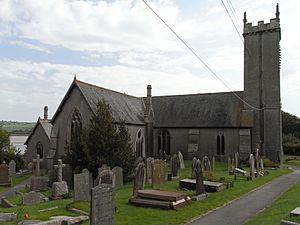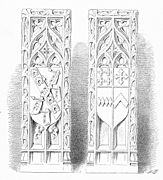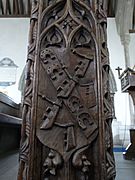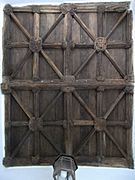St Andrew's Church, Bere Ferrers facts for kids
Quick facts for kids Church of St Andrew |
|
|---|---|

Church of St Andrew, viewed from the north-west
|
|
| Location | Bere Ferrers |
| Denomination | Church of England |
| Website | http://www.bereanglicans.org.uk/ |
| History | |
| Founded | 1333 |
| Dedication | Andrew the Apostle |
| Consecrated | 1333 |
| Architecture | |
| Years built | 1290-1340 |
| Specifications | |
| Number of towers | 1 |
| Administration | |
| Parish | Bere Ferrers |
| Diocese | Diocese of Exeter |
| Province | Province of Canterbury |
St Andrew's Church is a historic church located in Bere Ferrers, a village in Devon, England. It belongs to the Church of England. This church is special because it has the oldest stained-glass window in Devon, apart from Exeter Cathedral. This beautiful window is over 600 years old! The church building was likely constructed between 1290 and 1340. Records show that a special religious community was started here in 1333. The northern part of the church, called the transept, seems to be the oldest section. The southern aisle was probably added later, perhaps in the 15th century.
Contents
Discovering the Church's History and Design
This church has many interesting features from different time periods.
Ancient Features Inside the Church
One notable feature is the font, which is used for baptisms. It was built in the Norman style, which means it's very old and has a distinct, strong look. You can also see an unusual stone used for the altar. The church also has old wooden benches with special carvings on their ends. These carvings show detailed designs called traceried arches.
Memorials and Monuments
Inside the church, you can find an early medieval monument. It honors a knight and a lady, who were probably members of the Ferrers family. Their name, Ferrariis, is a Latin version of Ferrers. There are two other important monuments as well. One is a recess with a carved figure of another knight. The other is a large tomb chest from the 1520s, possibly for a nobleman named Robert Willoughby, 2nd Baron Willoughby de Broke.
The Story of Charles Alfred Stothard
In 1821, a famous artist and historian named Charles Alfred Stothard visited the church. He was known for drawing old buildings and monuments. Sadly, he died here after falling while making a drawing from a church window. His tombstone can be found in the churchyard.
Family Symbols and Coats of Arms
The church is also famous for its many examples of heraldry. Heraldry is the study of coats of arms and family symbols.
Carved Bench Ends with Family Crests
The church has oak pews (long benches) from the late 15th century. Their ends are beautifully carved. Two of these carvings are especially important because they show the coats of arms of the Ferrers and Willoughby families. These carvings are found at the ends of the central rows of pews, closest to the front of the church.
The carving on the north side shows a shield with four horseshoes. Horseshoes are called fer-de-cheval in French, which sounds like "Ferrers." This is a type of canting arms, where the symbol sounds like the family name. On top of the horseshoes, there are three ship's rudders. This rudder symbol was the badge of the Willoughby family. It was passed down from an older family called Cheyne.
The carving on the south side shows the full coat of arms for the Willoughby de Broke family. It looks similar to the one found on the tomb of Robert Willoughby, 1st Baron Willoughby de Broke (who died in 1502) in Callington, Cornwall.
Roof-Bosses with Ancestral Symbols
The ceiling of the south porch has oak beams. Where these beams meet, there are decorative carvings called "roof-bosses." Some of these bosses also show coats of arms from the families connected to the Willoughbys. These include the Ferrers, Latimer, and Cheyne families, whose symbols are also seen on the bench ends.
You can also see the coat of arms of the Gorges family. This family was connected to the Cheyneys. Their symbol is a "gurges," which is Latin for a whirlpool. This is another example of canting arms, as "gurges" sounds like "Gorges."
Gallery
 | William M. Jackson |
 | Juan E. Gilbert |
 | Neil deGrasse Tyson |




